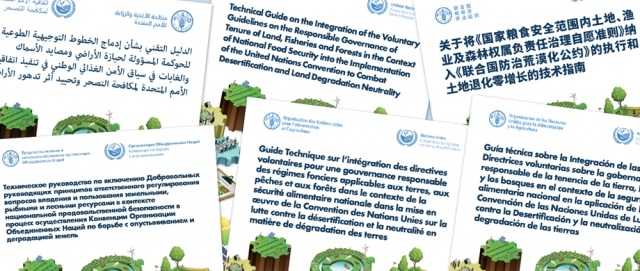Champion > Tools
Utilise FAO’s extensive collection of tools, from guidance to methodologies, to assist in the formulation, implementation and monitoring of policies, programmes and projects for SDG progression.
Search by
a74ea82c-4cf3-4e0e-ae71-926573b887e9.tmb-th600x400.png?Culture=en&sfvrsn=e5ea3726_1)
Tools
A multi-criteria assessment framework for national drought planning
31/12/2022
The increasingly frequent and severe droughts prompted the global community to adopt more proactive and integrated approaches to reduce or neutralize...
.tmb-th600x400.png?Culture=en&sfvrsn=14dab625_3)
Tools
RuralInvest: Fostering Access to Finance for Small-scale Entrepreneurs
01/12/2022
RuralInvest is a free toolkit designed to support field technicians in their work with entrepreneurs by allowing the systematization and development...

Tools
Technical Guide on the Integration of the Voluntary Guidelines on the Responsible Governance of Tenure of Land, Fisheries and Forests in the Context of National Food Security into the Implementation of the UNCCD and Land Degradation Neutrality
01/12/2022
The guide outlines the practical applications of the VGGT – an internationally recognized framework on the responsible governance of tenure – in the...
.tmb-th600x400.png?Culture=en&sfvrsn=105eaaf2_1)
Tools
EX-Ante Carbon-balance Tool for value chains (EX-ACT VC)
01/12/2022
The Ex-Ante Carbon-balance Tool for Value Chains (EX-ACT VC) is a quantitative multi-appraisal tool that evaluates the sustainability of agrifood value...

Tools
Environmental eXternalities ACcounting Tool (EX-ACT)
01/12/2022
EX-ACT aims at providing decision makers with evidence to steer action towards international climate and biodiversity commitments and the Sustainable...
.tmb-th600x400.png?Culture=en&sfvrsn=c70e295c_1)
Tools
Practical guide for the application of the Genebank Standards for Plant Genetic Resources for Food and Agriculture
01/12/2022
Well-managed genebanks both safeguard genetic diversity and make it available to breeders. The Genebank Standards for Plant Genetic Resources for Food...
.tmb-th600x400.png?Culture=en&sfvrsn=b0d9b7b1_1)
Tools
Voluntary code of conduct for food loss and waste reduction
01/12/2022
The Voluntary Code of Conduct for Food Loss and Waste Reduction sets out a generic framework of actions and guiding principles that should be followed...
.tmb-th600x400.png?Culture=en&sfvrsn=d7152d57_6)
Tools
Taking a Multisectoral One Health Approach : A Tripartite Guide to Addressing Zoonotic Diseases in Countries
30/11/2022
The 2019 TZG supports building by countries of the resilience and capacity to address emerging and endemic zoonotic diseases such as avian influenza,...
86cbc404-ad4e-4671-8440-99537508fb96.tmb-th600x400.png?Culture=en&sfvrsn=f980ebee_5)
Tools
A good practice guide for ethical and inclusive communications involving small-scale fisheries
20/10/2022
This guide provides practical and simple guidance on how to communicate about small-scale fisheries in an inclusive, responsible and ethical way that...
977a230b-c0c9-4e4d-8220-05ab889719d6.tmb-th600x400.png?Culture=en&sfvrsn=53e96be0_1)
Tools
Climate Risk Toolbox
23/03/2022
The Climate Risk Toolbox was developed to support climate-resilient project design. The tool is an open-access resource allowing users to obtain a climate...

Tools
THE FAO/WHO Food Control System Assessment Tool
21/02/2022
The objective of this tool is to propose a harmonized, objective and consensual basis to analyse the performance of a national food control system....

Tools
Evidence platform for agri-food systems and nutrition
31/12/2021
The 105 recommendations of the Voluntary Guidelines on Food Systems and Nutrition (VGFSyN) are categorized under 7 focus areas and several thematic...

Tools
Global capacity needs assessment methodology - Integrating nutrition objectives into agricultural extension and advisory services programmes and policies
31/12/2021
The Global Capacity Needs Assessment (GCNA) methodology examines the capacity gaps at the individual, organizational and enabling-environment levels.

Tools
Public food procurement for sustainable food systems and healthy diets
31/12/2021
Sustainable Public Food Procurement (PFP) represents a key game changer for food systems transformation. It can influence both food consumption and...
.tmb-th600x400.png?Culture=en&sfvrsn=1f45e92b_3)
Tools
A guide to forest–water management
31/12/2021
The purpose of A Guide to Forest–Water Management is to improve the global information base on the protective functions of forests for soil and water....
aa224c78-4380-45f9-a580-787012bd2435.tmb-th600x400.png?Culture=en&sfvrsn=fcdd04f8_1)
Tools
The Energizing Agriculture Assessment Tool (EAAT)
31/12/2021
The FAO/World Bank Energizing Agriculture Assessment Tool (EAAT) provides insight into the energy use of an agriculture value chain. It assesses current...
.tmb-th600x400.png?Culture=en&sfvrsn=d99cca42_1)
Tools
Methods for estimating greenhouse gas emissions from food systems
01/12/2021
This series of paper detail new methodologies for estimating key components of agri-food systems emissions. They focus on GHG emissions associated with...

Tools
How to use antibiotics effectively and responsibly - for the sake of human and animal health
01/12/2021
The use of antibiotics and thus the threat of of antimicrobial resistance (AMR) can be reduced by adopting the right husbandry practices. These publications...
.tmb-th600x400.png?Culture=en&sfvrsn=3eb7477_1)
Tools
Information toolkit on food biotechnologies with a focus on food safety
01/12/2021
The FAO Information toolkit on food biotechnologies with a focus on food safety serves as a basis to assist countries in addressing the general public’s...
8999d33d-51d5-421d-9d29-ee71f64ea057.tmb-th600x400.png?Culture=en&sfvrsn=85d18f73_1)
Tools
Checklists and technical guidelines to combat illegal, unreported and unregulated (IUU) fishing
01/12/2021
This series of “Checklists and technical guidelines to combat illegal, unreported and unregulated (IUU) fishing” provides as a reference guide for...
263f4881-592f-4139-90f6-a710df2a6d2c.tmb-th600x400.png?Culture=en&sfvrsn=9d4e35b5_1)
Tools
The Greenhouse Gas Data Management (GHG-DM) Tool
01/12/2021
The greenhouse gas data management (GHG-DM) tool helps greenhouse gas (GHG) inventory compilers manage the information related to the required activity...
